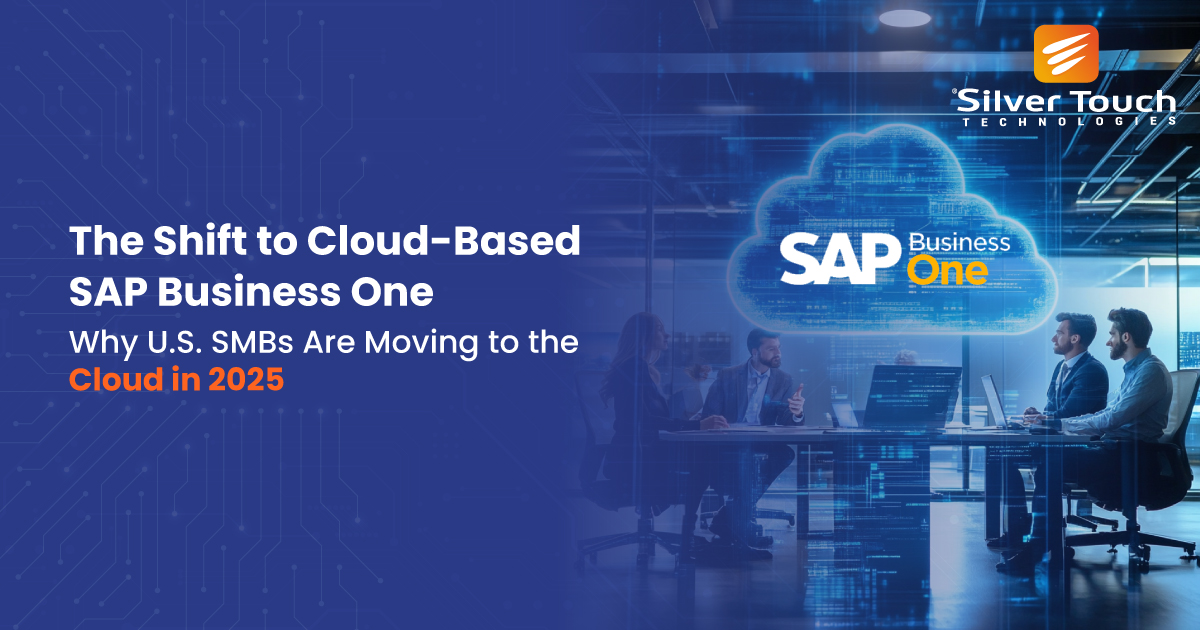A digital transformation era has brought about a paradigm shift in the ERP (Enterprise Resource Planning) ecosystem. Modern companies tend to adopt agile and scalable cloud solutions to meet the requirements of real-time data, enhanced efficiency, and flexibility. Therefore, over 65000 global SMBs trust SAP Business One (SAP B1). As US businesses continue to prefer cloud-based solutions in 2025, the role of SAP Business One Partner USA is set to increase.
This blog talks about the core benefits of migrating traditional on-premise systems to the cloud and the top beneficiaries of cloud ERP for SMBs. We will also discuss the future outlook for cloud-powered ERP solutions. Let’s start with understanding the importance of cloud in ERP solutions for resolving the key challenges of traditional on-premise systems.
Understanding the Cloud Evolution in ERP Systems
The shift to the cloud reshapes the future of modern businesses by eliminating the requirement for costly and high-maintenance physical servers. It fulfills the increasing requirement of agility and real-time data access to make meaningful decisions. Advanced solutions like SAP Business One Cloud USA can streamline the workflow and establish new standards for operational management. Let’s delve into the traditional on-premise challenges that the cloud can address.
The Traditional On-Premise Challenges
On-premise ERP systems pose several hurdles, especially for growing businesses or SMBs. It is due to high costs and complexities in managing physical infrastructure. These systems also hinder the company’s capability to scale quickly and manage remote work. Upfront capital is necessary for purchasing servers and networking hardware. Moreover, businesses must spend more on maintenance, power, and cooling. These issues increase dependency on IT teams.
The Rise of Cloud ERP Solutions
Cloud ERP for SMBs has emerged as a robust, enterprise-grade solution to address the challenges of traditional systems. It transforms the way businesses manage their core operations. It offers unparalleled operational efficiency with cost-effectiveness. SMBs can focus on business growth after SAP Business One Cloud ERP implementation, as this solution offers high flexibility and scalability.
Other characteristics of Cloud-powered ERP solutions are anywhere access with real-time visibility and quicker deployment. These solutions offer secure access to critical data from anywhere and at any time. This real-time data access can strengthen the decision-making process and improve collaboration for remote teams. Additionally, cloud-based ERP systems take less time in deployment because there is no need for any setup or infrastructure.
Finally, cloud ERP solutions have regular updates and continuous security patches to ensure a seamless performance. These solutions also open the doors to innovation for SMBs. Let’s explore the key reasons or benefits why more US SMBs select cloud-based SAP B1.

Why U.S. SMBs Are Choosing Cloud-Based SAP Business One
Small and mid-sized businesses in the USA are moving their core operations to SAP Business One Cloud ERP solutions to gain a competitive edge.
Apart from this, SMBs can leverage other benefits from this migration, including
1. Cost-Efficiency and Reduced IT Overhead
The cloud migration of the ERP system can make advanced applications more accessible and affordable for SMBs. It enables businesses to get rid of the need to purchase and maintain expensive physical servers. Feature-rich ERP solutions like SAP Business One Cloud USA offer a predictable subscription model (OpEx) so that companies can save big on on-premise hardware.
It is also useful for reducing dependency on in-house IT teams.
2. Scalability and Business Agility
The cloud-driven ERP solution enables US SMBs to respond to market fluctuations instantly and plan expansion. Cloud architecture in SAP B1 assists businesses in adding users and increasing capacity instantly. Its agility enables SMBs to adapt business processes quickly, promoting innovation. Additionally, cloud ERP solutions are useful in growing the footprint of SMBs across different US states or internationally.
3. Enhanced Security and Data Protection
SAP B1 Cloud has a powerful infrastructure to ensure compliance and data security. A reputable, certified SAP Partner in the USA can help SMBs deploy advanced solutions. Moreover, SAP B1 Cloud comes with automated system backups to reduce data loss. As SAP Partners update the solution with the latest security patches and other features, SMBs can meet the regulatory standards like SOC, CCPA, and GDPR effectively.
4. Real-Time Insights and Better Decision-Making
The cloud ERP for SMBs offers a single platform to centralize data and applications. SAP B1 Cloud platform ensures that every department gets insights in real time through a single, unified source of truth. Executives and managers can see these insights on customized and interactive analytics dashboards. This leads to better internal collaboration and accurate financial reporting for SMBs over the period.
5. Faster Innovation and Seamless Updates
In the case of SAP Business One Cloud ERP implementation, the vendor manages maintenance and upgrades. The vendor also assists in integrate the cloud-native solution with emerging technologies. As a result, US SMBs can leverage the benefits of predictive analytics and machine learning with advanced automation. This can promote innovation by streamlining workflows and saving resources.
However, it is essential to choose the right SAP Business Partner USA to leverage all these benefits. Here we mention the top beneficiaries of a cloud-based SAP B1 solution.
Key Industries in the U.S. Benefiting from Cloud-Based SAP Business One
Whether it is the Coca-Cola Company or Lockheed Martin Corporation, many big names in the USA bank upon the SAP Business One Cloud solution. States like California, Florida, Texas, and New York are at the top of the chart for the number of companies using SAP Business One. Manufacturing, retail, and wholesale sectors have emerged as the top beneficiaries of this ERP solution in recent years. Let’s delve into the importance of SAP Business One Cloud ERP solutions in these sectors.
Manufacturing
This sector leverages the migration to the cloud for integrating shop floor data with enterprise planning to drive operations more intelligently. Cloud-powered ERP solutions for SMBs are capable of integrating with IoT and other technologies for streamlining production.
Retail and E-Commerce
sector utilizes the cloud platform for creating a unified brand experience and simplifying the complexities of multiple sales channels. These ERP solutions are also useful for offering an omnichannel experience to customers with automated inventory syncing
Wholesale and Distribution
SAP Business One Cloud can provide SMBs with the visibility and automation required to reduce operational expenses and meet delivery timelines. Wholesalers use the cloud ERP solution for quick order processing and accurate demand forecasting.
If you’re still in a dilemma about migrating your existing, on-premise ERP system to the cloud, we provide step-by-step instructions.
Migration Made Easy — Moving from On-Premise to Cloud
Let’s face it. Though cloud technology is highly beneficial for SMBs, the migration of existing on-premise systems to the cloud needs excellent planning and execution. A trusted SAP Business One partner USA can ensure a smooth transition with minimal disruption and better realization of benefits. Here, we mention the cloud migration approach in 3 crucial steps.
Step-by-Step Migration Approach
A successful migration requires proper planning, assessment, testing, and ongoing assistance. The following are the three major steps that ensure business continuity during the migration process-
- Assess Existing Infrastructure
- Choose Right Model
- Migration, Testing and Support
This is an initial phase, and it involves a thorough assessment of the existing on-premise ERP or SAP Business One setup. This step is necessary for determining the project scope and identifying prerequisites effectively.
Selecting the right deployment model is another important step. SMBs need to make a decision between a public cloud model and a private cloud model for their new ERP solutions. This choice depends on several factors, like security and compliance.
This is the final step of transition. It involves transferring the existing corporate data and configurations to the new cloud ecosystem. This step is backed by rigorous user acceptance testing (UAT) and ongoing support or go-live assistance.
As a reputable partner, Silver Touch Technologies can assist SMBs in successful SAP Business One Cloud ERP implementation.
Role of Silver Touch Technologies USA in Migration
As a certified and official partner, Silver Touch Technologies USA has specialized technical expertise and vast experience in deploying SAP solutions across different industries. Our in-house team of experienced SAP professionals offers end-to-end migration and integration services from the initial planning to deployment to maintenance. We work in sync with the client’s team to minimize disruptions and optimize performance.
Our post-implementation support includes ongoing technical assistance and security monitoring for SAP Business One Cloud ERP solutions. We also provide SMBs with user training to ensure a smooth transition and maximize the ROI. As a trusted SAP Partner, we can make customized add-ons and implement them in your cloud-based SAP solution. Our holistic approach enables you to get the maximum strategic value as per your business needs.

Future Outlook — What’s Next for Cloud ERP and SAP Business One
Evolving technologies like AI, machine learning, and predictive analytics write the future of Cloud ERP for SMBs, including SAP Business One Cloud. The integration of these technologies can transform the existing ERP solution into an intelligent assistant that automates complex processes and predicts future demands. Moreover, the shift to cloud-based collaboration and a mobile-first ERP approach will enable companies to make decisions in real time.
Finally, we can expect that feature-rich cloud ERP solutions will gain popularity among US SMBs in the coming years, irrespective of their size and sectors. This will drive greater efficiency and make the entire ecosystem more responsive.
Conclusion
The migration of the traditional ERP system to SAP Business One Cloud USA is a strategic move for SMBs. This can reduce operational cost, increase agility, and improve security. It also gives more scalability to handle growth. However, it is essential to select the right cloud model and the right SAP partner to leverage the transformative benefits of the SAP B1 Cloud solution.
Looking for End-to-End SAP Business One Services for Your Enterprise in the USA? LET’S CONNECT!



